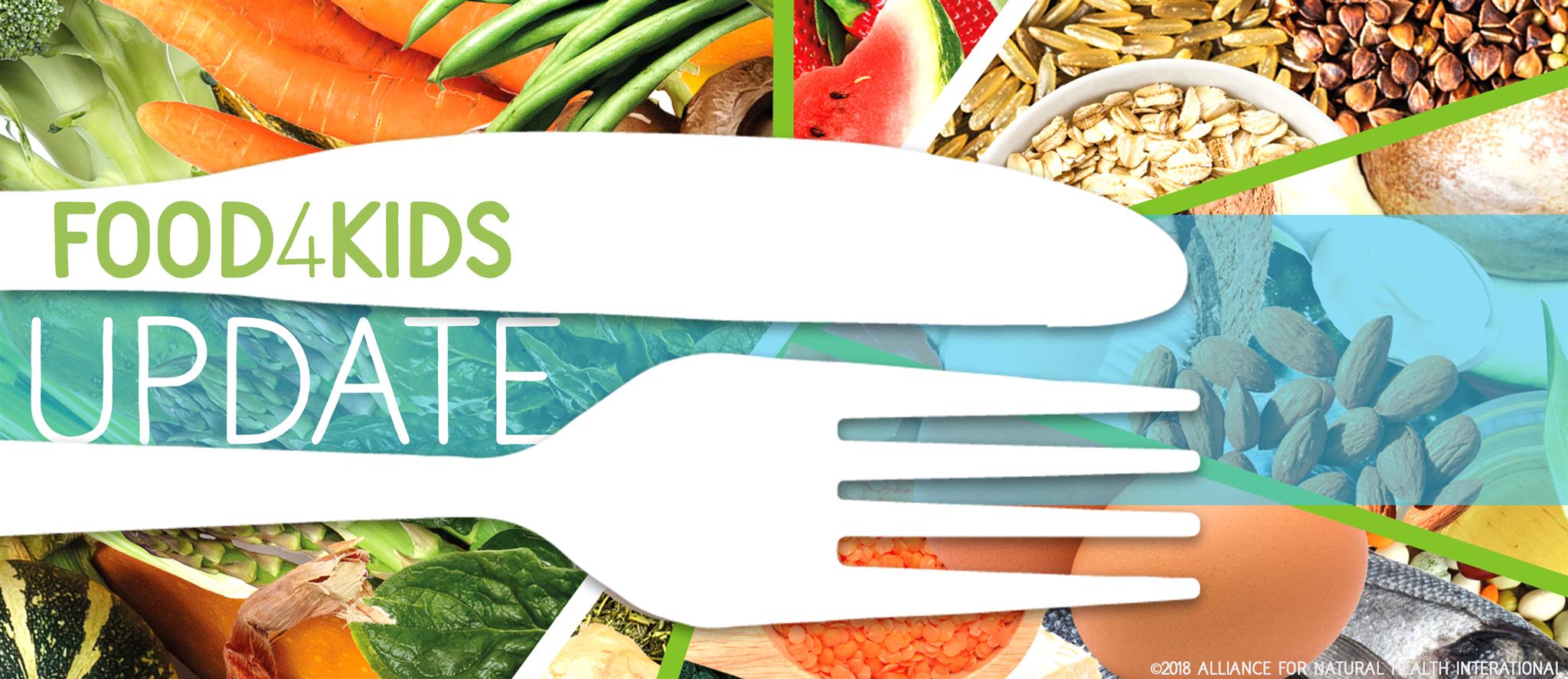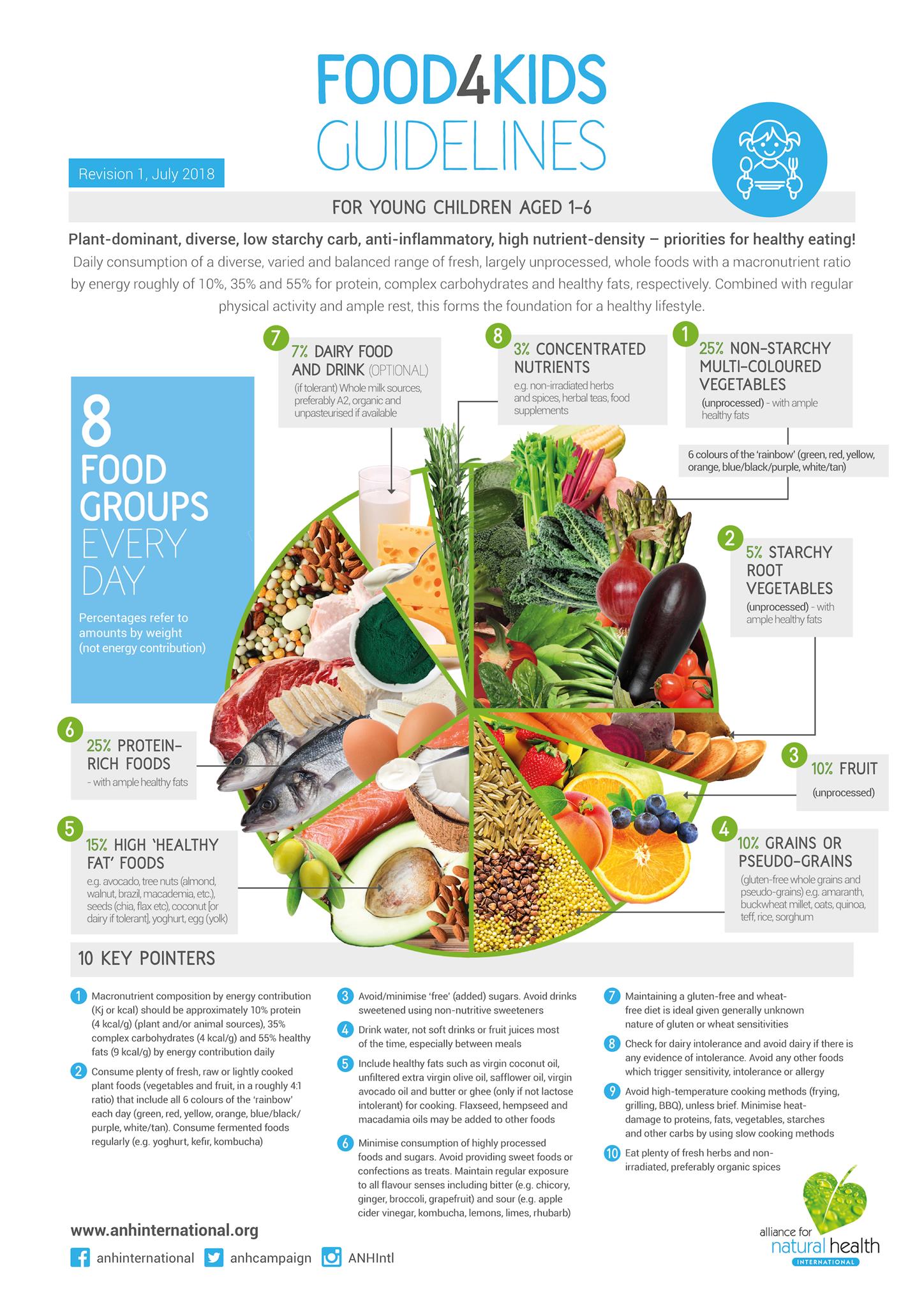Following the recent update to clarify the ANH-Intl Food4Health guidelines, here is our first update of the Food4Kids (F4K) guidelines following its 2015 launch.
In essence, the general scope of the guidelines remain the same. However, the new downloadable A4 poster reflects the requests we have had for further clarification and increased information to make the guidelines more user-friendly and practical.
Clarification at a glance
ANH recognises that the nutrition requirements of children up to age 6 are different to those of older children and adults. Following are the key points of difference between standard government advice and the F4K guidelines which:
- Recommend 8 food groups (Non-starchy multi-coloured vegetables / Starchy root vegetables / Fruit / Grains (gluten-free, wholegrain) / High ‘healthy fat’ foods / High protein foods / Dairy food and drink (optional) / Concentrated nutrients) unlike government guidelines, which recommend only 4 different food groups (starchy foods / fruit and vegetables / Meat, fish, eggs, beans and non-dairy sources of protein / Milk and dairy foods)
- Recommend that only about 35% energy from food be derived from carbohydrates. These being complex, non-gluten, carbs, primarily from non-starchy vegetables, as against the 50% suggested by government health authorities. Government suggestions still push the public towards carbs in the form of potatoes, pasta, bread and other sources of gluten-containing grains. As a result, many children are consuming an excess of starchy carbs with absent or inadequate levels of physical activity, thereby driving weight gain, blood sugar imbalance, insulin resistance and chronic, low-grade inflammation – predisposing these children to chronic disease.
- Recommend that over half (55%) the total energy in a child’s daily diet should come from healthy fats. These being found in a number of sources on the ‘plate’, namely; foods that are naturally rich in fats (e.g. avocado, nuts, seeds); from protein sources that naturally include healthy fats or to which healthy fats are added in their preparation (e.g. meat, fish, eggs) or salads and vegetables where healthy fats are added before eating
- Strongly deters parents from substituting healthy saturated fats (e.g. from coconut, whole milk/raw dairy products, animal protein sources) with refined vegetable oils (omega 6 fatty acids) because of misguided fear of fats. This substitution is still recommended by governments, but has contributed to – not reduced – cardio-metabolic diseases. Added to which, children need healthy fats for brain and nerve development.
- Underline the essentiality of largely unprocessed, whole foods for children, whereas government guidelines embrace the products of Big Food in an attempt to appease all sectors. ANH’s F4K guidelines also encourage parents to avoid using sweet treats as rewards and promotes palate education where children are regularly exposed to a variety of foods that include all flavours, particularly bitter and sour
- Highlight the importance of a daily diversity of plant foods, ensuring the full phytonutrient spectrum via all 6 colours of the ‘rainbow’ are eaten each day because food is information
- Recommend that young childrens' diets are entirely gluten and wheat free. This is because gluten and wheat related sensitivities are rarely diagnosed at a young age yet are surprisingly common. Despite what governments or the mainstream medical establishment would have you believe, research data implicating gluten in chronic and autoimmune diseases among genetically susceptible individuals is now incontrovertible. Sensitivity can strike at any age and it’s not always possible to accurately predict who may succumb to which symptoms or diseases, even with expensive tests (e.g. Cyrex tests, genetic testing). Whilst coeliac disease triggered by gluten may only affect 1% of the population, clinical experience suggests that as many as 50% are exhibiting symptoms of non-coeliac gluten sensitivity (NCGS) or non-coeliac wheat sensitivity (NCWS) after eating gluten or wheat containing foods e.g. bloating, inflammation, flatulence, energy loss, brain fog, skin irritation, extreme fatigue, etc. Whilst these may be transitory initially, regular and frequent consumption of gluten and wheat can over tax an already burdened immune system causing the development of more extreme pathology. As such, ANH has omitted gluten and gluten-containing grains from its Food4Kids guidelines, allowing any parent or carer to include it as an option should they feel motivated.
- Recommend regular consumption of concentrated, primarily plant-derived, nutrients such as those found in fresh herbs, non-irradiated spices, herbal teas and/or targeted food supplements. Fresh herbs and spices are rich in phytonutrients – nature’s medicine, powerful chemical messengers that inform and interact with our body systems – but are missing almost entirely from the modern, processed, food supply chain. Phytonutrients are essential for growing strong, healthy bodies.
- Recommend avoiding/minimising foods and drinks containing ‘free’ (added) sugars and avoiding altogether food and drinks sweetened with non-nutritive sweeteners e.g. aspartame, sucralose, acesulfame K. Instead ANH recommends that children be encouraged to drink water for the majority of the time, particularly between meals.
We hope the changes also reduce the need to refer back to the supporting articles and the scientific references that underpin the advice, but they are still available for those wanting the drill into the depth.
You can find this detailed background information on our Food4Health campaign page.









Comments
your voice counts
There are currently no comments on this post.
Your voice counts
We welcome your comments and are very interested in your point of view, but we ask that you keep them relevant to the article, that they be civil and without commercial links. All comments are moderated prior to being published. We reserve the right to edit or not publish comments that we consider abusive or offensive.
There is extra content here from a third party provider. You will be unable to see this content unless you agree to allow Content Cookies. Cookie Preferences